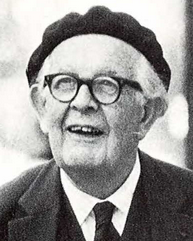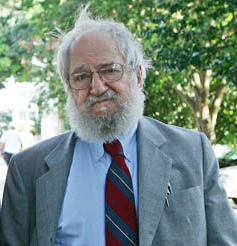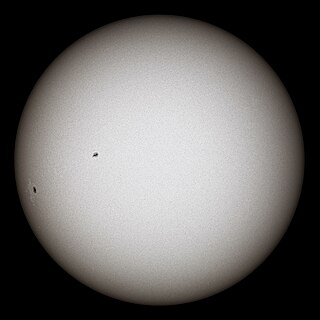Related Research Articles

Learning theory describes how students receive, process, and retain knowledge during learning. Cognitive, emotional, and environmental influences, as well as prior experience, all play a part in how understanding, or a worldview, is acquired or changed and knowledge and skills retained.

Jean William Fritz Piaget was a Swiss psychologist known for his work on child development. Piaget's theory of cognitive development and epistemological view are together called genetic epistemology.
Science education is the teaching and learning of science to school children, college students, or adults within the general public. The field of science education includes work in science content, science process, some social science, and some teaching pedagogy. The standards for science education provide expectations for the development of understanding for students through the entire course of their K-12 education and beyond. The traditional subjects included in the standards are physical, life, earth, space, and human sciences.
Social constructivism is a sociological theory of knowledge according to which human development is socially situated, and knowledge is constructed through interaction with others. Like social constructionism, social constructivism states that people work together to actively construct artifacts. But while social constructivism focuses on cognition, social constructionism focuses on the making of social reality.
Instructional scaffolding is the support given to a student by an instructor throughout the learning process. This support is specifically tailored to each student; this instructional approach allows students to experience student-centered learning, which tends to facilitate more efficient learning than teacher-centered learning. This learning process promotes a deeper level of learning than many other common teaching strategies.

Constructivism is a view in the philosophy of science that maintains that scientific knowledge is constructed by the scientific community, which seeks to measure and construct models of the natural world. According to constructivists, natural science consists of mental constructs that aim to explain sensory experiences and measurements, and that there is no single valid methodology in science but rather a diversity of useful methods. They also hold that the world is independent of human minds, but knowledge of the world is always a human and social construction. Constructivism opposes the philosophy of objectivism, embracing the belief that human beings can come to know the truth about the natural world not mediated by scientific approximations with different degrees of validity and accuracy.

Active learning is "a method of learning in which students are actively or experientially involved in the learning process and where there are different levels of active learning, depending on student involvement." Bonwell & Eison (1991) states that "students participate [in active learning] when they are doing something besides passively listening." According to Hanson and Moser (2003) using active teaching techniques in the classroom can create better academic outcomes for students. Scheyvens, Griffin, Jocoy, Liu, & Bradford (2008) further noted that "by utilizing learning strategies that can include small-group work, role-play and simulations, data collection and analysis, active learning is purported to increase student interest and motivation and to build students ‘critical thinking, problem-solving and social skills". In a report from the Association for the Study of Higher Education, authors discuss a variety of methodologies for promoting active learning. They cite literature that indicates students must do more than just listen in order to learn. They must read, write, discuss, and be engaged in solving problems. This process relates to the three learning domains referred to as knowledge, skills and attitudes (KSA). This taxonomy of learning behaviors can be thought of as "the goals of the learning process." In particular, students must engage in such higher-order thinking tasks as analysis, synthesis, and evaluation.
The psychology of learning refers to theories and research on how individuals learn. There are many theories of learning. Some take on a more behaviorist approach which focuses on inputs and reinforcements. Other approaches, such as neuroscience and social cognition, focus more on how the brain's organization and structure influence learning. Some psychological approaches, such as social constructivism, focus more on one's interaction with the environment and with others. Other theories, such as those related to motivation, like the growth mindset, focus more on individuals' perceptions of ability.

Constructivism in education is a theory that suggests that learners do not passively acquire knowledge through direct instruction. Instead, they construct their understanding through experiences and social interaction, integrating new information with their existing knowledge. This theory originates from Swiss developmental psychologist Jean Piaget's theory of cognitive development.
Radical constructivism is an approach to epistemology that situates knowledge in terms of knowers' experience. It looks to break with the conception of knowledge as a correspondence between a knower's understanding of their experience and the world beyond that experience. Adopting a skeptical position towards correspondence as in principle impossible to verify because one cannot access the world beyond one's experience in order to test the relation, radical constructivists look to redefine epistemology in terms of the viability of knowledge within knowers' experience. This break from the traditional framing of epistemology differentiates it from "trivial" forms of constructivism that emphasise the role of the knower in constructing knowledge while maintaining the traditional perspective of knowledge in terms of correspondence. Radical constructivism has been described as a "post-epistemological" position.

Constructionist learning is the creation by learners of mental models to understand the world around them. Constructionism advocates student-centered, discovery learning where students use what they already know to acquire more knowledge. Students learn through participation in project-based learning where they make connections between different ideas and areas of knowledge facilitated by the teacher through coaching rather than using lectures or step-by-step guidance. Further, constructionism holds that learning can happen most effectively when people are active in making tangible objects in the real world. In this sense, constructionism is connected with experiential learning and builds on Jean Piaget's epistemological theory of constructivism.
Rheta Goolsby DeVries was a professor at University of Northern Iowa's Regent's Center For Early Developmental Education, where she also served as director. She co-wrote many books along with Constance Kamii, concerning early childhood education curriculum that both influenced the field of early childhood mathematical instruction and accelerated the proliferation of constructivist-based teaching in the classroom.
Constructivist teaching is based on constructivism. Constructivist teaching is based on the belief that learning occurs as learners are actively involved in a process of meaning and knowledge construction as opposed to passively receiving information.

Discovery learning is a technique of inquiry-based learning and is considered a constructivist based approach to education. It is also referred to as problem-based learning, experiential learning and 21st century learning. It is supported by the work of learning theorists and psychologists Jean Piaget, Jerome Bruner, and Seymour Papert.

Scientific misconceptions are commonly held beliefs about science that have no basis in actual scientific fact. Scientific misconceptions can also refer to preconceived notions based on religious and/or cultural influences. Many scientific misconceptions occur because of faulty teaching styles and the sometimes distancing nature of true scientific texts. Because students' prior knowledge and misconceptions are important factors for learning science, science teachers should be able to identify and address these conceptions.
Inquiry-based learning is a form of active learning that starts by posing questions, problems or scenarios. It contrasts with traditional education, which generally relies on the teacher presenting facts and their knowledge about the subject. Inquiry-based learning is often assisted by a facilitator rather than a lecturer. Inquirers will identify and research issues and questions to develop knowledge or solutions. Inquiry-based learning includes problem-based learning, and is generally used in small-scale investigations and projects, as well as research. The inquiry-based instruction is principally very closely related to the development and practice of thinking and problem-solving skills.
In psychology, constructivism refers to many schools of thought that, though extraordinarily different in their techniques, are all connected by a common critique of previous standard approaches, and by shared assumptions about the active constructive nature of human knowledge. In particular, the critique is aimed at the "associationist" postulate of empiricism, "by which the mind is conceived as a passive system that gathers its contents from its environment and, through the act of knowing, produces a copy of the order of reality".
Eleanor Ruth Duckworth is a teacher, teacher educator, and psychologist.
Conceptual change is the process whereby concepts and relationships between them change over the course of an individual person's lifetime or over the course of history. Research in four different fields – cognitive psychology, cognitive developmental psychology, science education, and history and philosophy of science - has sought to understand this process. Indeed, the convergence of these four fields, in their effort to understand how concepts change in content and organization, has led to the emergence of an interdisciplinary sub-field in its own right. This sub-field is referred to as "conceptual change" research.
One of the most visible approaches to peer learning comes out of cognitive psychology, and is applied within a "mainstream" educational framework: "Peer learning is an educational practice in which students interact with other students to attain educational goals." Other authors including David Boud describe peer learning as a way of moving beyond independent to interdependent or mutual learning among peers. In this context, it can be compared to the practices that go by the name cooperative learning. However, other contemporary views on peer learning relax the constraints, and position "peer-to-peer learning" as a mode of "learning for everyone, by everyone, about almost anything." Whether it takes place in a formal or informal learning context, in small groups or online, peer learning manifests aspects of self-organization that are mostly absent from pedagogical models of teaching and learning.
References
- ↑ Lakatos, Imre (2 September 1970). "Falsification and the methodology of scientific research programmes". In Lakatos, Imre; Musgrave, Alan (eds.). Criticism and the Growth of Knowledge. Proceedings of the International Colloquium in the Philosophy of Science, London, 1965. Vol. 4. Cambridge University Press. pp. 91–196. ISBN 978-0-521-09623-2.
- ↑ Tobin, K. G. (1993). The practice of constructivism in science education . Psychology Press, preface Constructivism: A Paradigm for the Practice of Science Education, p.ix
- ↑ Matthews, M. R. (1997). Introductory comments on philosophy and constructivism in science education . Science & Education, 6(1), 5-14.
- ↑ Fensham, Peter J. (2004). The Evolution of Science Education as a Field of Research: Defining an Identity. Springer. ISBN 978-1-4020-1468-0.
- ↑ Piaget, Jean (2007) [1929]. The Child's Conception Of the World (2nd ed.). Rowman & Littlefield. ISBN 978-0-7425-5951-6.
- ↑ Piaget, Jean (1997) [1970]. The Principles of Genetic Epistemology. Routledge. ISBN 978-0-415-16890-8.
- ↑ Ausubel, D.P. (1968). Educational Psychology: A cognitive view. New York: Holt, Rinehart & Winston. ISBN 978-0030696404.
- ↑ Gagné, R.M. (1970). The Conditions of Learning (2nd ed.). Holt, Rinehart & Winston. ISBN 978-0039100698.
- ↑ Bruner, Jerome S. (1977) [1960]. The Process of Education (2nd ed.). Harvard University Press. ISBN 978-0-674-71001-6.
- ↑ Kelly, George (1963). A Theory of Personality: The Psychology of Personality Constructs . W.W. Norton. ISBN 978-0-393-00152-5.
- ↑ Vygotskiĭ, L. Lev Semenovich (1986) [1934]. Thought and Language . MIT Press. ISBN 978-0-262-72010-6.
- ↑ Vygotskiĭ, L. Lev Semenovich (1978). Mind in Society: The Development of Higher Psychological Processes . Harvard University Press. ISBN 978-0-674-57629-2.
- ↑ Driver, R.; Easley, J. (1978). "Pupils and paradigms: a review of literature related to concept development in adolescent science students". Studies in Science Education. 5 (1): 61–84. Bibcode:1978SScEd...5...61D. doi:10.1080/03057267808559857.
- ↑ Driver, R.; Erickson, G. (1983). "Theories-in-action: some theoretical and empirical issues in the study of students' conceptual frameworks in science". Studies in Science Education. 10 (1): 37–60. Bibcode:1983SScEd..10...37D. doi:10.1080/03057268308559904.
- ↑ Gilbert, J.K.; Watts, D.M. (1983). "Concepts, misconceptions and alternative conceptions: changing perspectives in science education". Studies in Science Education. 10 (1): 61–98. Bibcode:1983SScEd..10...61G. doi:10.1080/03057268308559905.
- ↑ Gilbert, J.K.; Osborne, R.J.; Fensham, P.J. (1982). "Children's science and its consequences for teaching". Science Education. 66 (4): 623–633. Bibcode:1982SciEd..66..623G. doi:10.1002/sce.3730660412.
- ↑ Osborne, R.J.; Wittrock, M.C. (1983). "Learning Science: a generative process". Science Education. 67 (4): 489–508. Bibcode:1983SciEd..67..489O. doi:10.1002/sce.3730670406.
- ↑ Taber, K.S. (2006). "Beyond Constructivism: the Progressive Research Programme into Learning Science". Studies in Science Education. 42 (1): 125–184. Bibcode:2006SScEd..42..125T. doi:10.1080/03057260608560222. S2CID 144337389.
- 1 2 3 Taber, Keith S. (2009). Progressing Science Education: Constructing the Scientific Research Programme Into the Contingent Nature of Learning Science. Springer. ISBN 978-90-481-2431-2.
- ↑ Driver, R. (1983). The Pupil as Scientist? . Milton Keynes: Open University Press. ISBN 978-0335101788. OCLC 10585522.
- ↑ Driver, R.; Guesne, E.; Tiberghien, A. (1985). Children's Ideas in Science . Milton Keynes: Open University Press. ISBN 978-0335150403.
- ↑ Black, Paul J.; Lucas, Arthur M. (1993). Children's Informal Ideas in Science. Routledge. ISBN 978-0-415-00539-5.
- ↑ Duit, R. (2009). "Bibliography—STCSE (Students' and Teachers' Conceptions and Science Education)". Kiel:IPN—Leibniz Institute for Science Education.
- ↑ Matthews, M.R. (1994). "Discontent With Constructivism". Studies in Science Education. 24 (1): 165–172. Bibcode:1994SScEd..24..165M. doi:10.1080/03057269408560045.
- ↑ Scerri, E.R. (2003). "Philosophical confusion in chemical education research". Journal of Chemical Education. 80 (5): 468–474. Bibcode:2003JChEd..80..468S. doi: 10.1021/ed080p468 .
- ↑ diSessa, A.A. (1993). "Towards an epistemology of physics". Cognition and Instruction. 10 (2–3): 105–225. doi:10.1080/07370008.1985.9649008.
- ↑ Smith, J.P.; diSessa, A.A.; Roschelle, J. (1993). "Misconceptions reconceived: a constructivist analysis of knowledge in transition". The Journal of the Learning Sciences. 3 (2): 115–163. doi:10.1207/s15327809jls0302_1.
- ↑ Key Stage 3 National Strategy. (2002). Framework for teaching science: years 7, 8 and 9. London: Department for Education and Skills.
- ↑ Shayer, M.; Adey, P. (1981). Towards a Science of Science Teaching: Cognitive development and curriculum demand. Oxford: Heinemann Educational Books. ISBN 978-0435578251. OCLC 7759952.
- ↑ Taber, K.S. (2011). "Constructivism as educational theory: Contingency in learning, and optimally guided instruction". In J. Hassaskhah (ed.). Educational Theory. Nova. ISBN 9781613245804.
- ↑ Fensham, Peter J.; White, Richard T. (1994). The Content of Science: A Constructivist Approach to Its Teaching and Learning . Falmer Press. ISBN 978-0-7507-0221-8.
- ↑ Mintzes, Joel J.; Wandersee, James H.; Novak, Joseph D., eds. (2005). Teaching Science for Understanding: A Human Constructivist View. Academic Press. ISBN 978-0-08-087924-6.
- ↑ Tobin, Kenneth G. (12 November 2012) [1993]. The Practice of Constructivism in Science Education. Routledge. ISBN 978-1-136-48974-7.
- ↑ Taber, K.S. (2002). Chemical Misconceptions: Prevention, Diagnosis, and Cure : Classroom Resources. Royal Society of Chemistry. ISBN 978-0-85404-381-1.